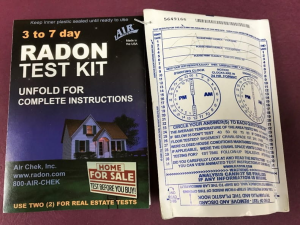Radon exposure is the leading cause of lung cancer for nonsmokers. In Florida, radon test data reveals that 1 out of every five homes tested had radon levels at or above the US Environmental Protection Agency’s action level for indoor radon. Anyone can use a “do-it-yourself” test kit to check their own building. The one-use kits are simple to use and are relatively inexpensive. If you live in Florida, you can get a FREE radon test kit by contacting the Florida Department of Health. http://www.floridahealth.gov/environmental-health/radon/Outreach/testkitrequest.html
You can also purchase from Kansas State University’s National Radon program’s website https://sosradon.org/purchase-kits 
Radon is a colorless, odorless, and tasteless gas that is naturally occurring in rocks, soil, and groundwater. People can be exposed to radon primarily from breathing radon in air that comes through cracks and gaps in buildings and homes. Having your home tested is the only effective way to determine if you or your family is at risk of high radon exposure. Elevated radon levels have been found in all types of buildings, including manufactured homes, schools, and high-rise condominiums. When breathing in radon, tiny radioactive particles can get trapped in the lungs. Over time, these radioactive particles increase the risk of lung cancer.
Like other health issues, prevention is easier than cure, so testing for radon in your home is a good idea.
For more information https://sosradon.org/files/sosradon/citizensguideradon2016.pdf or contact Katherine at the Suwannee County Extension office https://sfyl.ifas.ufl.edu/suwannee/ or your local county Extension office.
 0
0
